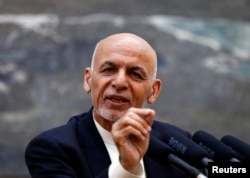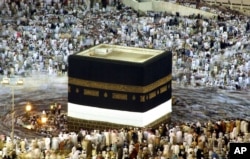Saudi Arabia is hosting an international Muslim scholars conference on peace and stability in Afghanistan next week, Afghan officials told VOA.
Delegations from 57 Islamic countries are expected to participate in the two-day conference Tuesday and Wednesday in Jeddah and Islam's holy city of Mecca, officials of the Afghanistan High Peace Council (HPC), a government body tasked with talking to the Afghan Taliban, told VOA.
Atturahman Saleem, HPC deputy chairman, said 110 Muslim scholars participating in the conference “are expected to discuss the Afghan war and peace process,” he added.
“At the end, a statement under the name of ‘Makka Al-Mukarramah’ will be issued,” Saleem added.
HPC expressed hope that the Afghan Taliban would send their representatives to participate in the conference.
The insurgents have yet to comment on the upcoming conference, but the group dismissed religious decrees issued by similar conferences held in Afghanistan, Pakistan and Indonesia in the past, which condemned acts of terrorism, such as suicide attacks and bombings, as non-Islamic acts and against the teachings of Islam.
After Islamic scholars conferences in Indonesia and Kabul earlier this year, attendees at the Saudi conference hope to persuade the Islamic world to unanimously reject violence in Afghanistan and encourage the Afghan Taliban to accept Afghan President Ashraf Ghani’s offer for unconditional peace talks.
Unconditional peace offer
Ghani made the offer to the Afghan Taliban in February, pledging to recognize the insurgent group as a legitimate political party if it agreed to give up violence.
The Taliban rejected Ghani’s offer and instead showed a willingness to talk directly with the United States.
In a statement issued June 4, referring to the Kabul and Indonesia conferences, Taliban said that religious conferences, under the name of Afghan and other Islamic countries are held at the behest of Americans “… to issue Islamic decrees against Taliban and challenge the legitimate jihad from religious perspective.”
The Taliban statement seemed to be in reference to the comments of Gen. John Nicholson, the commander of U.S. Forces-Afghanistan and the NATO-led Resolute Support who said during a press conference in March in Kabul that Taliban would be put under diplomatic, religious and military pressure.
“There will be religious pressure applied to the Taliban with the Ulemas [Islamic scholars] hosted in Indonesia and elsewhere to strip away the religious legitimacy for jihad in Afghanistan,” Gen. Nicholson said at the time.
Mecca’s symbolism
Mecca, the birthplace of Islam, is considered Muslims’ holiest city and respected by them. This week’s conference in the city raises hopes that the gathering will push the Taliban to give up violence.
Waheed Muzhda, an expert on Taliban, told VOA that he is not optimistic about the Saudi conference.
“Taliban would not accept the outcome of this conference. They ignored calls from Saudi Arabia when the kingdom asked the group, repeatedly, to expel al-Qaida leader Osama bin Laden from Afghanistan when the Taliban were in power,” Muzhda said.
“Saudi Arabia should have invited a delegation of the Taliban before the conference and listened to their demands and then discussed it with the Afghan government and other Islamic countries. A one-sided discussion will not produce effective results,” Muzhda added.
Pakistan’s role
The Afghan government believes that Pakistan has influence over the Afghan Taliban because the insurgent group’s leadership councils are based in different Pakistani cities.
Saleem, of the High Peace Council, said that Pakistani religious scholars and government can play a vital role in bringing the insurgent group to the negotiating table.
“Pakistani religious scholars, known to Taliban, are also expected to participate in the Saudi conference,” Saleem said.
US calls on Pakistan
At a roundtable discussion Thursday with a group of reporters at the U.S. State Department, Alice Wells, the principal deputy assistant secretary for the Bureau of South and Central Asian Affairs, once again stressed that Pakistan should take “sustained and decisive” action against the Afghan Taliban.
“What we are looking for are the sustained and decisive steps taken to persuade the Taliban leadership to come to the negotiation and it is that absence of sustained and decisive steps that led the president [Trump] in January to suspended military assistance (to Pakistan),” Wells said.
Pakistan denies having influence over the Afghan Taliban.
Pakistan’s Foreign Ministry spokesperson, Mohammad Faisal said Thursday during a press conference that his country was not solely responsible for bringing Taliban to the negotiating table.
“Absolutely not. We have repeatedly stated that all stakeholders in Afghanistan will have to share this responsibility, and Pakistan is ready to play its role in it,” Faisal said.
VOA’s Hasib Danish Alikozai from Washington and Ayaz Gul from Islamabad contributed to this report.






